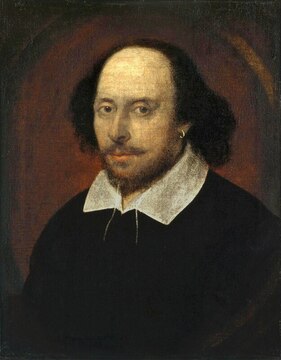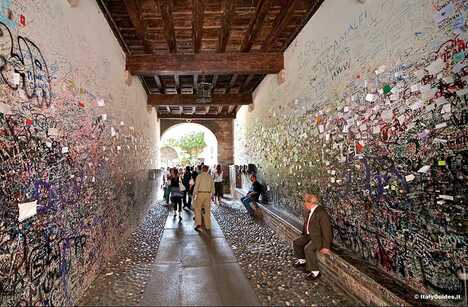William Shakespeare
William Shakespeare (1564 – 1616) was an English playwright, poet, and actor.
He wrote 39 plays (with about half of them considered comedies) and two long poems in his lifetime. He lived in Stratford-upon-Avon, in Warwickshire, England. His plays are still performed today. He is often quoted in modern writing.
By 1594 he was an actor in The Chamberlain's Men acting company. His plays are of different kinds, or genres. There are histories, tragedies and comedies. These plays are among the best known in English literature and are studied in schools around the world. Shakespeare wrote his works between about 1590 and 1613. He is considered the first writer who wrote a tragicomedy. (A tragicomedy is a play that mixes comedy and tragedy, with a happy ending.)
Shakespeare's plays are written in poetic language. Many of the plays are set in strange, distant places and times. They are still popular today. The stories are often exciting, very funny (in the comedies), or very sad (in the tragedies) and make people want to know what happens to his characters. He says much about things that are still important today, like love, sadness, hope, pride, hatred, jealousy, and foolishness.
Shakespeare added new words and phrases to the English language. He also made some words more popular. He created over 1,700 English words.
(Source: https://simple.wikipedia.org/wiki/William_Shakespeare)
He wrote 39 plays (with about half of them considered comedies) and two long poems in his lifetime. He lived in Stratford-upon-Avon, in Warwickshire, England. His plays are still performed today. He is often quoted in modern writing.
By 1594 he was an actor in The Chamberlain's Men acting company. His plays are of different kinds, or genres. There are histories, tragedies and comedies. These plays are among the best known in English literature and are studied in schools around the world. Shakespeare wrote his works between about 1590 and 1613. He is considered the first writer who wrote a tragicomedy. (A tragicomedy is a play that mixes comedy and tragedy, with a happy ending.)
Shakespeare's plays are written in poetic language. Many of the plays are set in strange, distant places and times. They are still popular today. The stories are often exciting, very funny (in the comedies), or very sad (in the tragedies) and make people want to know what happens to his characters. He says much about things that are still important today, like love, sadness, hope, pride, hatred, jealousy, and foolishness.
Shakespeare added new words and phrases to the English language. He also made some words more popular. He created over 1,700 English words.
(Source: https://simple.wikipedia.org/wiki/William_Shakespeare)
Watch these two videos to learn more about William Shakespeare and why his writing is still so beloved today:
|
|
|
Shakespearean Insults
Ready to have a little fun? Use the Shakespearean Insult Kit to create your own insults!
1) Choose 1 word from each column to create your very own Shakespearean insult!
2) Write the modern English translation of your insults.
3) Create a vicious argument between two people, using your new insults! (The third document is a sample dialogue/argument with Shakespearean insults.)
|
|
| ||||||
Romeo and Juliet
Now it's time to read the real thing! Download the file or click on the link below to read Act 2, Scene II of "Romeo and Juliet"- The balcony scene. Read the text, then watch the short video below, then read the text again. What examples of figurative speech (metaphors, similes, personification, images...) can you find in this scene?
Balcony Scene PDF:
|
Links for text and video: | ||



